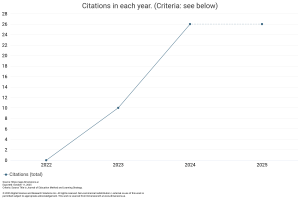Exploring the Influence of Emotional Autonomy on Academic Flow Theory: A Study on Cadets at Politeknik Ilmu Pelayaran (PIP) Makassar
DOI:
https://doi.org/10.59653/jemls.v1i02.72Keywords:
Emotional Autonomy, Academic Flow, Influence, Cadet, Politeknik Ilmu PelayaranAbstract
Emotional autonomy is the ability of young cadets to act independently, take the initiative, overcome obstacles, and effectively manage emotions while engaging in activities. Academic flow is a state experienced by individuals when fully immersed, focused, concentrated, comfortable, and enjoying what they do due to intrinsic motivation. This study examines the relationship between Emotional Autonomy and academic flow theory among cadets at Politeknik Ilmu Pelayaran (PIP) Makassar. The sample consisted of 170 participants selected through random sampling. The quantitative research method used the emotional autonomy scale and the LIS Inventory Flow Academic as measurement tools. Data analysis was conducted using the Product Moment correlation technique with SPSS 24.0 for Windows. The results revealed a correlation coefficient of 0.643 between emotional autonomy and academic flow, with a significance level 0.000 (p<0.01). The findings indicate a positive relationship between emotional autonomy and academic flow. This research provides valuable insights for Cadets in enhancing their emotional autonomy to attain a state of academic flow during lectures and residential activities.
Downloads
References
Csikszentmihalyi, M., Montijo, M. N., & Mouton, A. R. (2018). Flow theory: Optimizing elite performance in the creative realm. In APA handbook of giftedness and talent (pp. 215–229). American Psychological Association. https://doi.org/10.1037/0000038-014
Ellwood, R., & Abrams, E. (2018). Student’s social interaction in inquiry-based science education: How experiences of flow can increase motivation and achievement. Cultural Studies of Science Education, 13(2), 395–427. https://doi.org/10.1007/s11422-016-9769-x
Fong Lam, U., Chen, W.-W., Zhang, J., & Liang, T. (2015). It feels good to learn where I belong: School belonging, academic emotions, and academic achievement in adolescents. School Psychology International, 36(4), 393–409. https://doi.org/10.1177/0143034315589649
García-Mendoza, M. D. C., Parra, Á., Sánchez-Queija, I., & Arranz Freijo, E. B. (2020). Emotional autonomy and adjustment among emerging adults: The moderating role of family relationships. Scandinavian Journal of Psychology, 61(3), 380–387.
Holmes, J. (1997). Attachment, autonomy, intimacy: Some clinical implications of attachment theory. British Journal of Medical Psychology, 70(3), 231–248. https://doi.org/10.1111/j.2044-8341.1997.tb01902.x
Ibáñez, M. B., Di Serio, Á., Villarán, D., & Delgado Kloos, C. (2014). Experimenting with electromagnetism using augmented reality: Impact on flow student experience and educational effectiveness. Computers & Education, 71, 1–13. https://doi.org/10.1016/j.compedu.2013.09.004
Lamborn, S. D., & Groh, K. (2009). A four-part model of autonomy during emerging adulthood: Associations with adjustment. International Journal of Behavioral Development, 33(5), 393–401. https://doi.org/10.1177/0165025409338440
Landhäußer, A., & Keller, J. (2012). Flow and Its Affective, Cognitive, and Performance-Related Consequences. In S. Engeser (Ed.), Advances in Flow Research (pp. 65–85). Springer, New York. https://doi.org/10.1007/978-1-4614-2359-1_4
Marusak, H. A., Thomason, M. E., Sala-Hamrick, K., Crespo, L., & Rabinak, C. A. (2018). What’s parenting got to do with it: Emotional autonomy and brain and behavioral responses to emotional conflict in children and adolescents. Developmental Science, 21(4), e12605. https://doi.org/10.1111/desc.12605
Noor, J. (2011). Meteode Penelitian. Jakarta: Kencana.
Pratiwi, Z. R., & Kumalasari, D. (2021). Dukungan orang tua dan resiliensi akademik pada mahasiswa. Analitika: Jurnal Magister Psikologi UMA, 13(2), 138-â.
Rheinberg, F., & Engeser, S. (2018). Intrinsic motivation and flow. Motivation and Action, 579–622.
Shernoff, D. J., Csikszentmihalyi, M., Shneider, B., & Shernoff, E. S. (2003). Student engagement in high school classrooms from the perspective of flow theory. School Psychology Quarterly, 18, 158–176. https://doi.org/10.1521/scpq.18.2.158.21860
Susanto, A. (2018). Bimbingan dan konseling di Sekolah: Konsep, teori, dan aplikasinya. Kencana.
Ulfa, A. Y. (2020). Psikologi pendidikan. Penerbit Aksara TIMUR.
Zimmer-Gembeck, M. J., & Collins, W. A. (2008). Chapter nine autonomy development during adolescence. Blackwell Handbook of Adolescence, 8, 175.
Downloads
Published
How to Cite
Issue
Section
License
Copyright (c) 2023 Makmur Syam

This work is licensed under a Creative Commons Attribution-ShareAlike 4.0 International License.
Authors who publish with this journal agree to the following terms:
- Authors retain copyright and grant the journal right of first publication with the work simultaneously licensed under a Creative Commons Attribution-ShareAlike that allows others to share the work with an acknowledgement of the work's authorship and initial publication in this journal.
- Authors are able to enter into separate, additional contractual arrangements for the non-exclusive distribution of the journal's published version of the work (e.g., post it to an institutional repository or publish it in a book), with an acknowledgement of its initial publication in this journal.
- Authors are permitted and encouraged to post their work online (e.g., in institutional repositories or on their website) prior to and during the submission process, as it can lead to productive exchanges, as well as earlier and greater citation of published work (See The Effect of Open Access).
























